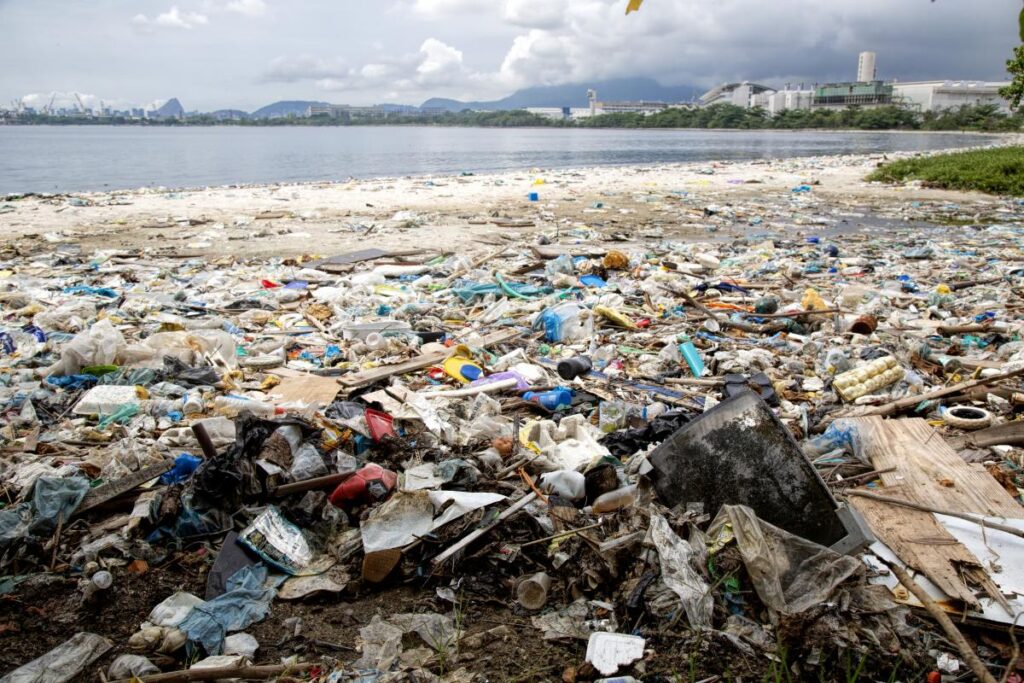
Marine plastic pollution is a serious global problem. It is estimated that, annually, eight million tons of this waste reach the oceans, affecting marine ecosystems, the climate, people’s quality of life and economic activities that depend on the sea, such as fishing and tourism. Oceana study shows that Brazil is responsible for at least 325 thousand tons of these residues that are taken from onshore sources such as open dumps and inadequate disposal.
The report “An ocean free of plastic – challenges to reduce marine pollution in Brazil” points out that most of this marine waste is made up of disposable plastic products and packaging. It also reveals that, in general, these items are not conceived, designed or placed on the market to be reused or rotated in their life cycle – they are made for consumption and immediate disposal, generating a large amount of non-biodegradable waste.
Brazil produces about seven million tons of plastic per year, an amount that places the country in the position of the largest producer in Latin America. Of this amount, three million tonnes of single-use plastics are placed on the market each year. “After being discarded, the plastic waste travels several paths until it reaches the ocean, where it impacts the lives of thousands of animals, from zooplankton to mammals and sea birds, many of them already threatened with extinction”, says the director general of Oceana in Brazil , oceanologist Ademilson Zamboni.
Regarding impacts on marine life, the Oceana study points out:
- That in Brazil, over a small portion of the coast (Southeast and South regions), more than 3,700 animals that have ingested plastic waste have already been collected and necropsied;
- 10% animals that ingested plastic died because of it;
- and of these, 85% are endangered species.
With 10,959 kilometers of coastline, according to the 2019 Statistical Yearbook of the Brazilian Institute of Geography and Statistics (IBGE), the country has a duty to work to reduce plastic waste. Proof of the arrival of these pollutants on the coast is the study that shows that 70% of the materials and fragments collected in beach cleaning on the Brazilian coast are made of plastics, mainly packaging.“Nothing that has been proposed so far has given, or will give, an account of solving these problems, as no solution goes through the main point – the reduction of production and supply of plastics. We need a national law to progressively decrease the supply of disposable plastics, as well as to have companies and commercial establishments attentive to the demand of increasingly conscious consumers, offering their products and services without this material. Establishments can, for example, become plastic-free zones ”, explains Zamboni.
The Brazilian industry annually produces around 500 billion disposable plastic items such as cups, cutlery, plastic bags, and packaging for the most diverse applications. There are 15 thousand items per second. With little recycling, most of them accumulate in landfills, garbage dumps – but a very important part goes to the environment. Faced with this scenario, Oceana proposes:
- The creation of a national law to reduce the supply and use of disposable plastic: Strong legislation is urgently needed, inspired by international policies, laws and good experiences, aiming to reduce the generation of preventable, problematic and unnecessary plastic waste, following the example of more than 40 countries in the world.
- Offering alternatives without plastic to the consumer: Companies should offer consumers options without plastic for their products and packaging, at a cost similar or less than the packaging used today. This means that companies need to replace disposable products and packaging with reusable, proven biodegradable or compostable options, and innovate and invest in delivery systems with returnable or reusable packaging.
- Creation of free plastic zones : Oceana proposes the creation of areas where single-use plastic is not supplied, marketed or used, which can range from corporate and government offices, airports, schools, hotels, beach bars, to festivals, events or cities, for example. They can be implemented by communities, governments or commercial establishments.
The organization also reinforces that the approach to reduce plastic waste needs to be seen as an opportunity for the development of innovative businesses, new technologies and markets that favor the reuse of packaging, a crucial part of the solution to pollution.
“Our country needs businesses focused on the circular economy, with the development of solutions that eliminate the production of plastic waste,” says environmental engineer and marine scientist at Oceana in Brazil, Lara Iwanicki.
Oceana’s report also warns that, although recycling is an important step in the waste management process that has already been generated, its implementation occurs more slowly than is necessary to face the crisis. Globally, only 9% of all plastic waste is recycled. In Brazil, data on plastic recycling rates are divergent and even in the best scenario it shows that the country recycles less than a quarter of what it generates.
“Unfortunately, recycling does not keep up with the volume and speed of disposable plastic production in the country. The scenario is aggravated by the fact that this process does not target a large part of disposable products such as straws, cutlery, plates, glasses and containers for transporting meals. The National Solid Waste Policy does not provide for responsibilities or differentiated treatment for these items. With no value for the recycling market, disposable products become discarded and represent a cost to the waste management system and an impact on the environment ”, warns Iwanicki.
“Without immediate changes in the way society is subjected to the use of disposable plastic, the amount of this waste that enters the marine environment will triple in the next 20 years causing even more environmental, social and economic damage”, warns the director-general of Oceana, Ademilson Zamboni.